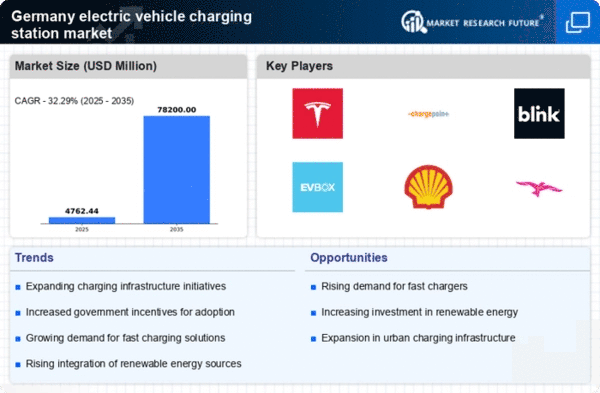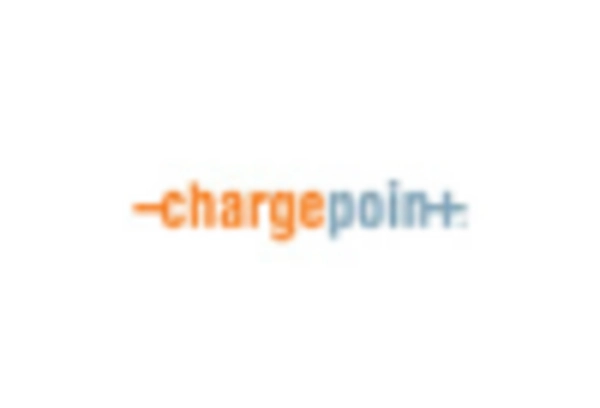Rising Electric Vehicle Sales
The electric vehicle-charging-station market is experiencing a surge in demand, driven by the increasing sales of electric vehicles in Germany. In 2025, electric vehicle sales are projected to account for approximately 30% of total vehicle sales, reflecting a significant shift in consumer preferences. This rise in electric vehicle ownership necessitates a corresponding expansion of charging infrastructure to accommodate the growing number of electric vehicles on the road. As more consumers transition to electric vehicles, the demand for convenient and accessible charging stations intensifies, thereby propelling the electric vehicle-charging-station market forward. This trend indicates a robust correlation between electric vehicle sales and the expansion of charging networks.
Government Incentives and Subsidies
The electric vehicle-charging-station market in Germany benefits significantly from government incentives and subsidies aimed at promoting electric vehicle adoption. The German government has allocated substantial funds, amounting to €3 billion, to support the installation of charging stations across the country. This financial backing encourages both private and public sector investments in charging infrastructure, thereby enhancing accessibility for electric vehicle users. Furthermore, tax benefits and rebates for consumers purchasing electric vehicles contribute to a growing market. As a result, the electric vehicle-charging-station market is likely to experience accelerated growth, driven by these supportive policies that aim to reduce carbon emissions and promote sustainable transportation.
Corporate Sustainability Initiatives
Many corporations in Germany are increasingly adopting sustainability initiatives, which include the installation of electric vehicle-charging stations. Companies are recognizing the importance of reducing their carbon footprint and promoting environmentally friendly practices. As part of their corporate social responsibility strategies, businesses are investing in charging infrastructure to support their employees and customers who drive electric vehicles. This trend not only enhances the electric vehicle-charging-station market but also aligns with Germany's broader goals of achieving carbon neutrality by 2045. The integration of charging stations in corporate settings is likely to foster a culture of sustainability and encourage more individuals to consider electric vehicles.
Urbanization and Infrastructure Development
The ongoing urbanization in Germany is a critical driver for the electric vehicle-charging-station market. As cities expand and populations grow, the demand for efficient transportation solutions increases. Urban planners are increasingly incorporating electric vehicle-charging stations into new developments and retrofitting existing infrastructure to accommodate electric vehicles. This trend is particularly evident in metropolitan areas where the concentration of electric vehicle users is higher. The integration of charging stations into urban infrastructure not only supports the electric vehicle ecosystem but also aligns with Germany's commitment to sustainable urban mobility. Consequently, the electric vehicle-charging-station market is likely to thrive as urbanization continues to shape transportation dynamics.
Technological Innovations in Charging Solutions
The electric vehicle-charging-station market is being propelled by rapid technological innovations in charging solutions. Developments such as ultra-fast charging technology and smart charging systems are enhancing the efficiency and convenience of charging electric vehicles. For instance, ultra-fast chargers can deliver up to 350 kW, significantly reducing charging time to under 30 minutes for many electric vehicle models. These advancements not only improve user experience but also attract more consumers to electric vehicles, thereby stimulating the demand for charging stations. As technology continues to evolve, the electric vehicle-charging-station market is expected to adapt and expand, catering to the needs of a growing electric vehicle user base.
















